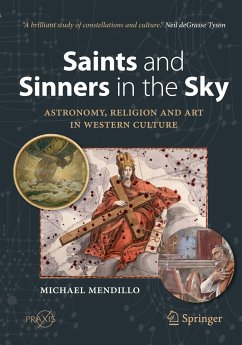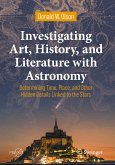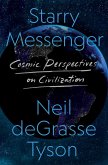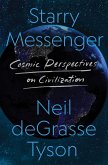In this book, Boston University Professor of Astronomy Michael Mendillo takes readers deep into the annals of history, showing how visual depictions of the heavens evolved in tandem with science and religion throughout much of Western culture.
With unprecedented scope and scale, Professor Mendillo explores how cave art, illuminated manuscripts, sculptures, paintings and architecture reflected some of the great religious and secular battles taking place over the course of centuries. Enter a world of biblical proportions, where constellations of ancient heroes and pagans were thoroughly recast as Christian saints and the Twelve Apostles.
This nontechnical narrative brings vitality and accessibility to some of the most enduring subjects in human history, offering a lively new exploration of the visual connections between celestial phenomena and artistic expression.
"Ever wonder how religion and art became forces of imagination on our night skies?Or how the night skies became forces of imagination on our religion and art? In this brilliant study of constellations and culture, Michael Mendillo, professor of astronomy at Boston University, reveals that the canopy of stars has been an ideologically contested space from the beginning, ensuring that the next time you look up, the sky will look completely different to you."- Neil deGrasse Tyson, Director, Hayden Planetarium, American Museum of Natural History
"Saints and Sinners impressionistically reveals the connections of art, astronomy, and religion in Western culture to illuminate the age-old quest for celestial-terrestrial connections." - Roberta J.M. Olson, author of Giotto's Portrait of Halley's Comet and Cosmos: The Art and Science of the Universe
"Professor Mendillo's book does a priceless service, opening the doors of our minds to images that will stir us, because the heavens are partof us, and we all long to know how and why." - Rev. David R. Thom, MIT Chaplain and Convener of the Cambridge Faculty Roundtable on Science, Art & Religion
"Over a lifetime devoted to astronomical research and teaching, Michael Mendillo has indulged a parallel passion for artistic representations of the heavenly bodies. In this sumptuous volume, he explores the projection of our changing belief systems onto the constant stars." - Dava Sobel, author of Longitude, Galileo's Daughter and The Glass Universe
Hinweis: Dieser Artikel kann nur an eine deutsche Lieferadresse ausgeliefert werden.
With unprecedented scope and scale, Professor Mendillo explores how cave art, illuminated manuscripts, sculptures, paintings and architecture reflected some of the great religious and secular battles taking place over the course of centuries. Enter a world of biblical proportions, where constellations of ancient heroes and pagans were thoroughly recast as Christian saints and the Twelve Apostles.
This nontechnical narrative brings vitality and accessibility to some of the most enduring subjects in human history, offering a lively new exploration of the visual connections between celestial phenomena and artistic expression.
"Ever wonder how religion and art became forces of imagination on our night skies?Or how the night skies became forces of imagination on our religion and art? In this brilliant study of constellations and culture, Michael Mendillo, professor of astronomy at Boston University, reveals that the canopy of stars has been an ideologically contested space from the beginning, ensuring that the next time you look up, the sky will look completely different to you."- Neil deGrasse Tyson, Director, Hayden Planetarium, American Museum of Natural History
"Saints and Sinners impressionistically reveals the connections of art, astronomy, and religion in Western culture to illuminate the age-old quest for celestial-terrestrial connections." - Roberta J.M. Olson, author of Giotto's Portrait of Halley's Comet and Cosmos: The Art and Science of the Universe
"Professor Mendillo's book does a priceless service, opening the doors of our minds to images that will stir us, because the heavens are partof us, and we all long to know how and why." - Rev. David R. Thom, MIT Chaplain and Convener of the Cambridge Faculty Roundtable on Science, Art & Religion
"Over a lifetime devoted to astronomical research and teaching, Michael Mendillo has indulged a parallel passion for artistic representations of the heavenly bodies. In this sumptuous volume, he explores the projection of our changing belief systems onto the constant stars." - Dava Sobel, author of Longitude, Galileo's Daughter and The Glass Universe
Hinweis: Dieser Artikel kann nur an eine deutsche Lieferadresse ausgeliefert werden.








